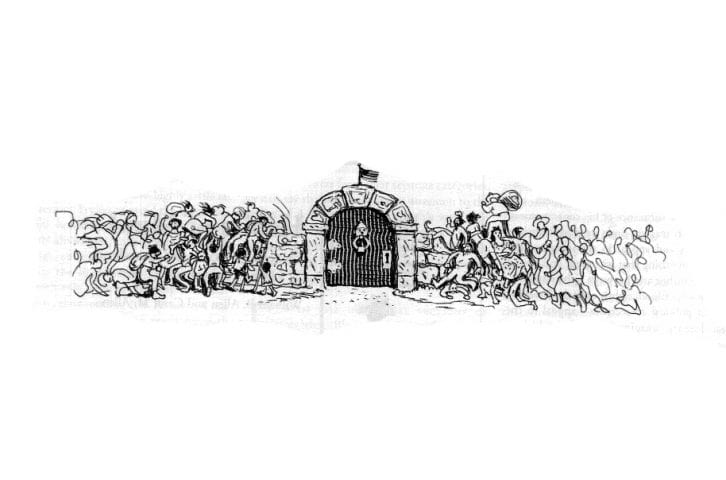Almost from its origins, economics has been viewed as a morally flawed discipline, even if an important one. Probably the most stinging rebuke was hurled in 1849 when Thomas Carlyle referred to economics as "the dismal science." Earlier, Edmund Burke had lamented, "The age of chivalry is gone—that of sophisters, economists, and calculators, has succeeded; and the glory of Europe is extinguished forever." And more recently, but far less famously, mountaineer-philosopher Jack Turner decried the economists' approach to conservation as "[reeking] of cynicism—as though having failed to persuade and woo your love you suddenly switch to cash. The new economic conservationists think they are being rational; I think they treat Mother Nature as a whorehouse."
A list of such quotations could be multiplied indefinitely. Of course, every discipline has its detractors. But the contrast between the practical importance accorded economics on the one hand, and the animosity directed at it on the other, stands out. This animosity calls for an explanation beyond the complaint that the detractors don't understand economics. True, not many people know much about economics, but those who understand any specialized discipline seldom exceed a small number. What is it about economics that keeps people from seeing that the economist's way of thinking is not only useful, but morally laudable?
"Better outcomes result from superior incentives, not superior people," would make a good motto for economics. From Adam Smith to George Stigler, economists have argued that those who experience material progress are not superior to those who don't; they simply benefit from superior social institutions and the incentives that those institutions create. As Stigler observed, when we are faced with poor outcomes, "It is social institutions that one should castigate: men respond to these situations in predictable, and probably unchangeable, ways."
But aren't better social institutions the result of better people designing them? Not according to economists. Adam Ferguson, a Scottish moral philosopher and economist who was one of Adam Smith's contemporaries, argued that "nations stumble upon establishments [social institutions] which are indeed the result of human action but not the execution of human design." Traditionally, economists have rejected the notion that people design the institutional rules and arrangements that make them successful. As Friedrich Hayek has argued, "We live in a society in which we can successfully orientate ourselves, and in which our actions have a good chance of achieving their aims, not only because our fellows are governed by known aims or known connections between means and ends, but because they are also confined by rules whose purpose or origin we often do not know and of whose very existence we are often not aware." Some societies achieve more than others because they have superior social institutions, but those institutions are not evidence of the superiority of those blessed with them.
Consider this interesting example of how concentrating on improving incentives rather than people is the best way to achieve noble outcomes. In the late 18th century prisoners were shipped from England to Australia, with ship captains being paid a specified amount for each prisoner who boarded their ships in England. Unfortunately, the death rate on these voyages was very high, with a sample from trips between 1790 and 1792 showing a death rate of 12 percent, and an appalling 37 percent on one trip. Most of the fatalities were clearly the result of overcrowding and poor nutrition, and many pleas were directed at ship captains, appealing to their moral obligation to provide humane treatment to their charges. But these pleas had no noticeable effect on the death rate. Finally someone (probably an economist) suggested improving the incentives instead of trying to improve the ship captains, by paying the captains on the basis of how many prisoners walked off their boats in Australia. The improvement was dramatic. Three ships carrying a total of 422 prisoners made the trip from England to Australia in 1793, and only one prisoner died in route. None of the ship captains became better people, but in response to better incentives they acted as if they had.
The advantages from better incentives extend far beyond achievements so obviously desirable as not killing people through neglect. Proper behavior is usually more difficult to determine and motivate. After all, how can we be sure which activities will do the most good for our fellow man? Answering that question requires knowing the preferences of countless people, the relative availability of numerous resources at different locations, existing technology, and the activities in which others are engaged, to mention only a few of the relevant and constantly changing considerations. The single most impressive accomplishment of economics is explaining how market prices convey information on the productive activities that countless people around the globe consider the most valuable, convey this information to those in the best position to act on it, and motivate appropriate responses. When people respond to market prices in ways that best serve their own purposes, they are participating in a spontaneously adjusting network of coordinated activity that serves the interests of all.
* * *
No serious person argues that market incentives work perfectly. But in facilitating constantly adjusting patterns of productive cooperation among large numbers of geographically dispersed and culturally diverse people in ways that promote the material progress of all, market incentives are unrivaled. The level of social cooperation and progress achieved through market incentives could, without those incentives, never be achieved by improving the morality or intelligence of people, even if the most optimistic assumptions about human perfectibility were correct.
But it is not just material progress that results from market incentives. The material progress that characterizes market economies is explained by the ability of market incentives to promote harmonious and productive interaction between literally billions of people from diverse cultural backgrounds and ethnic origins—exactly the type of diversity for which so many contemporary critics of market economies express enthusiasm. Markets allow people from all over the world, with various languages, religious beliefs, interests, and skills, to profit from their differences by specializing their efforts in ways that best serve their mutual interests. Markets penalize parochialism and cultural isolation while rewarding those who expand their markets by developing knowledge of, and sensitivity to, a wide variety of culturally influenced interests and concerns.
The advantages of cultural diversity have long been recognized by economists. For example, the case for such diversity has seldom been better stated than in John Stuart Mill's 1848 discussion of the advantages of international trade and the incentives of commerce. According to Mill:
It is hardly possible to overrate the value, for the improvement of human beings, of things which bring them into contact with persons dissimilar to themselves, and with modes of thought and action unlike those with which they are familiar. Commerce is…the purpose of the far greater part of the communication which takes place between civilized nations. Such communication has always been…one of the primary sources of progress…. It was in vain to inculcate feelings of brotherhood among mankind by moral influences alone, unless a sense of community of interest could also be established; and that sense we owe to commerce.
The emphasis that economists place on incentives also leads them to reject racial explanations for social progress. Recall Thomas Carlyle's stinging criticism of economics as the "dismal science." Carlyle, a well-known English social critic and essayist, used this term in an angry response to economists (the most prominent being John Stuart Mill) for criticizing his position that slavery should be continued because blacks were inferior to whites and incapable of taking care of themselves (the remark occurs in his "Occasional Discourses on the Negro Question," published in 1849). Carlyle's argument was, in part, based on the lack of social and economic progress blacks had achieved in their own societies. The blatant racism represented in the writings of Carlyle, and commonly accepted in his day, had long been criticized by economists going back to Adam Smith. Certainly economists can be proud of their long history of opposition to slavery and racism, and their non-racist explanation of why some societies have developed more than others. But given the virtue of the economic perspective, and the noble objectives that policies based on this perspective promote, why are so many of those who claim to support such objectives hostile to economics?
Properly understood, economics is not just a useful discipline, it is a noble one. It is concerned with promoting the highest aspirations of mankind—harmony, cooperation, tolerance, freedom, material prosperity, and human flourishing. Yet this message seldom gets communicated. Why not? There are surely many reasons, but, paradoxically, many people view economics unfavorably for the very reason that its perspective promotes the things they favor. While economists see proper incentives as necessary for achieving virtuous objectives, many people think that resorting to incentives implies somehow abandoning, or even despising, virtue. Accomplishing good things by improving people is more emotionally satisfying than the economic approach of "bribing" people to do good. This makes it easy to dismiss economics as crass and corrupt, especially when economists, as they often do, aggressively dismiss attempts to improve people as a waste of time.
True, the notion that better outcomes are best achieved by better people easily leads to the highly dubious (and typically racist) conclusion that developed societies are populated by better people. And those who consider themselves socially concerned and informed would never accept this conclusion if stated directly. But it seems to be difficult for them to admit that the economists' emphasis on better incentives, instead of better people, serves as a barrier to racist conclusions.
I should acknowledge that economists have done a poor job persuading others of the virtue of improving incentives. Instead, they often seem to delight in emphasizing the importance of incentives in ways that disgust as many people as possible. In their formal models, as well as in many of their attempts to communicate with the general public, economists rather adamantly assume that people are best represented by the "economic man," one who is concerned only with his own interests, and maybe (just maybe) the interests of a few loved ones. This assumption can be useful in understanding how socially desirable outcomes can emerge from market incentives without any assistance from good intentions. But economics would be viewed with more sympathy and understanding if more economists acknowledged that "economic man" is a caricature that ignores much that is most admirable and meaningful in our lives.
* * *
Even economists can be offended by the "economic man." As the economist Ken Boulding said, "No one in his senses would want his daughter to marry an economic man, one who counted every cost and asked for every reward, was never afflicted by mad generosity or uncalculating love…. Economic man is a clod." If ever a man needed improving, it is economic man, and almost everyone would agree that the world would be better for it. And in their more reflective moments, most economists would agree that some good does result from attempts to improve, not just the few "economic men" who might exist, but real people who are capable of "mad generosity" and "uncalculating love." Almost 50 years ago, Dennis Robertson, a practicing economist, expressed the point well. "There exists in every human breast an inevitable state of tension between the aggressive and acquisitive instincts and the instincts of benevolence and self-sacrifice," he wrote. "It is for the preacher, lay or clerical, to inculcate the ultimate duty of subordinating the former to the latter. It is the humbler, and often invidious, role of the economist to help, so far as he can, in reducing the preacher's task to manageable dimensions."
In sum, many of those who proclaim their love of virtue are too quick to dismiss economics, and the perspective it brings to important social concerns, as an ally in the struggle for noble achievements and human betterment.



